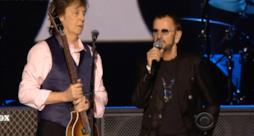The Beatles - Blackbird - The Beatles [White Album] [Stereo Remastered] - 2009
All sound recording and images are copyrighted by their respective copyright owners. Copyright: Apple Corps Ltd., EMI Records Ltd., Parlophone (UK), Capitol Records (USA) Members: John Lennon, Paul McCartney, George Harrison, Ringo Starr Writer: Lennon/McCartney Producer: George Martin Original Album Released: November 22, 1968 The Beatles Official Web Page: http://www.thebeatles.com/ EMI Music: http://www.emimusic.com/ Parlophone Records: http://www.parlophone.co.uk/ Capitol Records: http://www.capitolrecords.com/ "Blackbird" is a Beatles song from double-disc album The Beatles (also known as The White Album). Blackbird was written by Paul McCartney, but credited as usual to Lennon/McCartney. McCartney was inspired to write it while in Scotland as a reaction to racial tensions escalating in America in the spring of 1968. Origins: McCartney explained on PBS's Great Performances (Paul McCartney: Chaos and Creation at Abbey Road), aired in 2006, that the guitar accompaniment for "Blackbird" was inspired by Bach's Bourrée in E minor, a well known classical guitar piece. As kids, he and George Harrison tried to learn Bourrée as a "show off" piece. Bourrée is distinguished by melody and bass notes played simultaneously on the upper and lower strings. McCartney adapted a segment of Bourrée as the opening of "Blackbird," and carried the musical idea throughout the song. The first night his future wife Linda Eastman stayed at his home, McCartney played it to the fans camped outside his house. Composition and recording: The song was recorded 11 June 1968 in Abbey Road studios, with George Martin as the producer and Geoff Emerick as the audio engineer.[3] It is a solo performance with McCartney playing a Martin D 28 acoustic guitar. The track includes recordings of a blackbird singing in the background The instrumentation is tapping, guitar, vocal and birdsong overdub. The tapping is a metronome which was deliberately included in the final mix. The mono version contains bird sounds different from the stereo recording, and was originally issued on a mono incarnation of The Beatles (it has since been issued worldwide as part of The Beatles in Mono CD box set). The song appears on Love with "Yesterday", billed as "Blackbird/Yesterday". "Blackbird" provides an introduction to "Yesterday". Covers and cultural references: Elements of the lyrics "take these broken wings and learn to fly" have re-appeared in other pop songs over the years, notably the number one hit "Broken Wings" by Mr. Mister and the Savage Garden song, "Gunning Down Romance" from the Affirmation album. Sections of "Blackbird" were incorporated into The Waterboys' cover of the Van Morrison song "Sweet Thing" on their album Fisherman's Blues, and into the end of U2's "Beautiful Day" during their set at the Live 8 concert in Hyde Park, London on 2 July 2005, as well as some of the shows on the Vertigo Tour. Dynamite Hack references it at the end of their cover of "Boyz-N-The-Hood." Sarah McLachlan performed it for the soundtrack of the 2001 film I Am Sam. Evan Rachel Wood performed it in the 2007 film Across the Universe. Charles Manson took the song, along with "Helter Skelter" and "Piggies," as a metaphor for black-white race relations in the United States, which purportedly inspired his murders. Album: The Beatles is the ninth official British album and the fifteenth American album by The Beatles, a double album released in 1968. It is commonly known as The White Album as it has no graphics or text other than the band's name (and, on the early LP and CD releases, a serial number) on its plain white sleeve. The album was the first the Beatles undertook following the death of their manager, Brian Epstein, and the first released by their own record label, Apple. Originally entitled A Doll's House, the title was changed when the British progressive rock band Family released the similarly titled Music in a Doll's House earlier that year. The Beatles was written and recorded during a period of turmoil for the group. After visiting the Maharishi Mahesh Yogi in India and having a particularly productive songwriting session in early 1968, the group returned to the studio for recording from May to October 1968, only to have conflict and dissent drive the group members apart. Drummer Ringo Starr quit the band for a brief time, leaving bassist Paul McCartney to perform drums on some of the album's songs. Upon release in November 1968, the album received mixed to positive reviews and reached the number one spot on the charts in the United Kingdom and United States. The album is notable for the eclectic nature of its songs, which has divided critics in evaluating the album's legacy. In 2003, the album was ranked number 10 on Rolling Stone magazine's list of "The 500 Greatest Albums of All Time"
Altro su #The Beatles
Iscriviti alla newsletter di AllSongs
Riceverai i nostri aggiornamenti anche via email, è semplicissimo!
Iscrivendoti acconsenti alle condizioni d'uso di AllSongs
![The Beatles - While My Guitar Gently Weeps - The Beatles [White Album] [Stereo Remastered] - 2009](https://scontent.ccdn.cloud/thumb/allsongs/471707ab-560c-410e-b766-a92203f00ce9/the-beatles-while-my-guitar-gently-weeps-the-beatles-white-album-stereo-remastered-2009-60x60.jpg) Precedente
Precedente
 Successivo
Successivo
 Hey Jude - Paul McCartney e Ringo Starr
Hey Jude - Paul McCartney e Ringo Starr